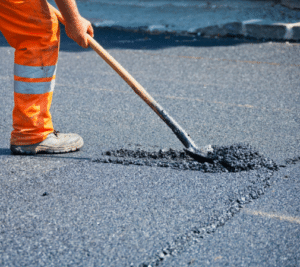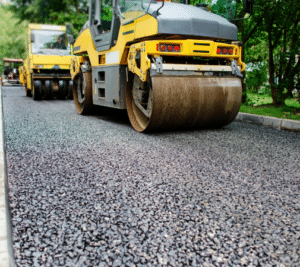Are you planning to pave your driveway or expand your parking area? If so, you may be wondering whether to choose a concrete apron or asphalt for your project. Both materials have advantages and disadvantages, so making the right decision is crucial. Don’t worry; I’m here to help you determine the best option.
Concrete aprons have been popular for driveways and parking areas for many years. They offer durability, strength, and a clean, polished look. However, asphalt has also gained popularity due to its affordability and flexibility. With so many factors to consider, it’s essential to weigh the pros and cons of each material before making your decision.
In this article, I will compare concrete aprons and asphalt, discussing their benefits and drawbacks so you can make an informed choice for your paving project. By the end, you’ll clearly understand which option is right for you.
What is a Concrete Apron?
A concrete apron is a paved area that acts as an entrance or exit from a driveway, parking lot, or other paved area. It is typically constructed of concrete and can be customized to fit the property owner’s needs. Concrete aprons are most commonly found around residential homes, but they can also be used in commercial settings. The primary benefit of having a concrete apron is its added durability. Concrete aprons are less likely to crack and break under heavy loads, unlike asphalt, which can be easily damaged by heavy traffic.
What is Asphalt?
Asphalt is a paving material consisting of bituminous materials such as tar or asphalt cement combined with crushed stone, gravel, sand, and other natural or recycled materials. Asphalt is a popular choice for paving because it is relatively inexpensive and can be easily applied in large quantities. It is also durable and can withstand heavy loads, although it may not sometimes last as long as concrete.
Benefits of a Concrete Apron
The primary benefit of having a concrete apron is its added durability. Concrete aprons are less likely to crack and break under heavy loads, unlike asphalt, which can be easily damaged by heavy traffic. Concrete aprons also provide superior traction in wet or icy conditions, making them an excellent choice for driveways or other areas that may become slippery during inclement weather. Additionally, a concrete apron’s beauty can increase your property’s curb appeal.
Benefits of Asphalt
Asphalt is an economical choice when it comes to paving. It is much more affordable than concrete and can be applied in large quantities quickly and efficiently. Additionally, asphalt is highly durable and can withstand heavy loads without cracking or breaking. Asphalt also provides superior traction in wet or icy conditions, making it an excellent choice for driveways.
Drawbacks of a Concrete Apron
The primary drawback of having a concrete apron is the cost. Concrete aprons are more expensive to install than asphalt due to the labor and material costs of pouring and finishing the concrete. Additionally, concrete aprons can be challenging to maintain, as dirt or debris may need to be removed manually from between the cracks to keep them looking good. Finally, if there is a need to repair or replace a concrete apron, it may be more difficult and expensive than repairing an asphalt apron.
Drawbacks of Asphalt
The primary drawback of asphalt is that it can become damaged more easily than concrete. Asphalt can be easily damaged by heavy traffic, as well as extreme temperatures. Additionally, asphalt may require more frequent maintenance to keep it looking good and functioning correctly. Finally, if there is a need to repair or replace an asphalt surface, it may be more difficult and expensive than repairing a concrete surface.
Which Is Right for You?
Several factors should be considered when deciding between a concrete apron or asphalt. The primary considerations include the use of the paved area, the budget available, and the desired aesthetic. If you are looking for a long-term solution that can withstand heavy loads or high traffic, then concrete is likely your best option. It is more durable than asphalt and also offers better customization options. However, if cost is an issue, then asphalt may be the better choice as it is much cheaper to install and maintain. Choosing between a concrete apron or asphalt should be based on your specific needs and budget.
In conclusion, whether you choose a concrete apron or asphalt for your driveway, the most important thing is to make a decision that fits your needs and preferences. Consider factors such as cost, durability, maintenance, and aesthetic appeal. Ultimately, both options have advantages and disadvantages, so weigh them carefully and choose the one that aligns with your priorities. Whichever you choose, remember that a well-maintained driveway can enhance your property’s curb appeal and value.
If you’re looking for a reliable and experienced driveway paving provider, look no further than Saguaro Asphalt! Our expert professionals are committed to providing you with top-notch service at competitive prices. Contact us today to get started on your paving project and see why Saguaro Asphalt is the best choice for all of your asphalt needs!



